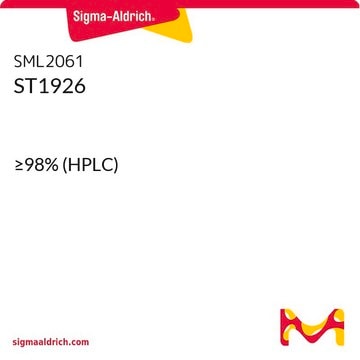SRP3114
Midkine human
recombinant, expressed in E. coli, ≥98% (SDS-PAGE), ≥98% (HPLC), suitable for cell culture
Synonym(s):
MK, NEGF-2
Sign Into View Organizational & Contract Pricing
All Photos(1)
About This Item
UNSPSC Code:
12352202
NACRES:
NA.32
Recommended Products
biological source
human
recombinant
expressed in E. coli
Assay
≥98% (HPLC)
≥98% (SDS-PAGE)
form
lyophilized
mol wt
13.4 kDa
packaging
pkg of 20 μg
technique(s)
cell culture | mammalian: suitable
impurities
<0.1 EU/μg endotoxin, tested
color
white to off-white
UniProt accession no.
shipped in
wet ice
storage temp.
−20°C
Gene Information
human ... MDK(4192)
Related Categories
General description
Recombinant human Midkine is a 13.4 kDa protein containing 123 amino acid residues including five intra-molecular disulfide bonds.
Application
Midkine human has been used in cell viability assay and cell proliferation assay to determine its association with EMT (epithelial-mesenchymal transition) and gemcitabine resistance in biliary tract cancer.
Biochem/physiol Actions
Midkine (MK) and its functionally-related protein Pleiotrophin are heparin-binding neurotrophic factors that signal through the same receptor, known as anaplastic lymphoma kinase (ALK). MK (midkine) plays an important regulatory role in epithelial-mesenchymal interactions during fetal development and in postnatal lung development. MK chemoattracts embryonic neurons, neutrophils and macrophages. Signaling through the ALK (anaplastic lymphoma kinase) receptor MK exerts angiogenic, growth and survival activities during tumorigenesis. MK is expressed predominantly during midgestation in the brain and several other organs and is down-regulated at birth.
Sequence
VAKKKDKVKK GGPGSECAEW AWGPCTPSSK DCGVGFREGT CGAQTQRIRC RVPCNWKKEF GADCKYKFEN WGACDGGTGT KVRQGTLKKA RYNAQCQETI RVTKPCTPKT KAKAKAKKGK GKD
Physical form
Lyophilized from 0.4x PBS, pH 7.4.
Reconstitution
Centrifuge the vial prior to opening. Reconstitute in water to a concentration of 0.1-1.0 mg/ml. Do not vortex. This solution can be stored at 2-8°C for up to 1 week. For extended storage, it is recommended to further dilute in a buffer containing a carrier protein (example 0.1% BSA) and store in working aliquots at -20°C to -80°C.
Storage Class Code
11 - Combustible Solids
WGK
WGK 3
Flash Point(F)
Not applicable
Flash Point(C)
Not applicable
Certificates of Analysis (COA)
Search for Certificates of Analysis (COA) by entering the products Lot/Batch Number. Lot and Batch Numbers can be found on a product’s label following the words ‘Lot’ or ‘Batch’.
Already Own This Product?
Find documentation for the products that you have recently purchased in the Document Library.
Jesús Cadenas et al.
Journal of assisted reproduction and genetics, 38(6), 1341-1348 (2021-05-30)
To investigate the effect of different FSH concentrations on human oocyte maturation in vitro and its impact on gene expression of key factors in the surrounding cumulus cells. The study included 32 patients who underwent unilateral oophorectomy for ovarian tissue
Dmitry Nikiforov et al.
Journal of assisted reproduction and genetics, 37(4), 891-904 (2020-02-26)
The aim of the present study was to improve the in vitro maturation (IVM) procedure using oocytes from surplus ovarian tissue after fertility preservation. Twenty-five patients aged 17-37 years were included in the study. Maturation was compared between oocytes collected in
Therapeutic potential of midkine in cardiovascular disease.
Kadomatsu K, et al.
British Journal of Pharmacology, 171(4), 936-944 (2014)
Hui-Lian Huang et al.
International journal of clinical and experimental pathology, 8(5), 5387-5394 (2015-07-21)
To investigate the inhibitory effect of midkine-binding peptides on human umbilical vein endothelial cells (HUVECs) proliferation and angiogenesis of xenograft tumor. The midkine-binding peptides were panned by Ph.D.-7(™) Phage Display Peptide Library Kit, and the specific binding activities of positive
Midkine regulates pleiotrophin organ-specific gene expression: evidence for transcriptional regulation and functional redundancy within the pleiotrophin/midkine developmental gene family.
Herradon G, et al.
Biochemical and Biophysical Research Communications, 333(3), 714-721 (2005)
Our team of scientists has experience in all areas of research including Life Science, Material Science, Chemical Synthesis, Chromatography, Analytical and many others.
Contact Technical Service








